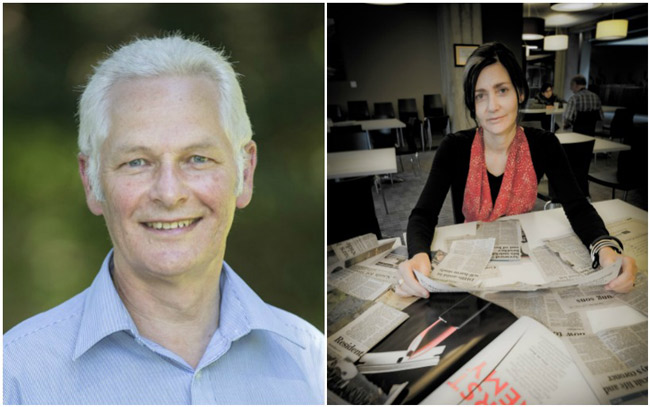Dr John Adams and Professor Sunny Collings take a look at student mental health and suicide prevention.

Dr John Adams and Professor Sunny Collings.
The issue of university student mental health and student suicide has received some welcome media attention recently. Welcome, because it throws a spotlight on the issue of the mental health of our young people and what needs to happen in the environment they live and learn in to support their resilience and their growing social and individual identity.
Universities have particular responsibilities towards their students. At Otago, most of our students are young and from out of town. There is a duty to provide an environment that not only supports their educational achievement, but also provides a constructive atmosphere for their social and individual development.
"The foundation of suicide prevention is a healthy environment where people feel they are supported and belong, with opportunities for strong social networks."
Internationally, there is awareness of the significant rate of emotional distress and illness in student populations. For instance, a recent international study across nine countries (not including New Zealand) found that almost one third of tertiary students suffered from common psychiatric disorders over a one year period. Other international data supports this. There is no reason to think that New Zealand universities are any different.
Everyone wants to help to prevent young people from dying by suicide. Yet, unfortunately, we are not able to predict suicide in individuals. An international study has shown that the prevalence of suicidal thinking and behaviour in tertiary students is lower than in the general population of young people. We do know, however, that when suicidal behaviours and thinking do emerge among students it is often precipitated by issues such as relationship breakdown or being betrayed by someone close. These issues as well as academic stress can also play a part in the onset of depression. For example, rates of burnout and depression in medical students are high and seem to increase as their course goes on.
The foundation of suicide prevention is a healthy environment where people feel they are supported and belong, with opportunities for strong social networks. Few intervention strategies are effective if applied alone. A published review of evidence on the primary prevention of suicide in tertiary institutions indicates that no single intervention was supported by strong evidence. What seems most appropriate is therefore a coordinated approach across many facets of a university's functioning. This is the approach that Otago has adopted.
Actions we are taking include building a positive, healthy, respectful, and caring campus environment, where equity and diversity are valued; interventions that reduce the stigma associated with emotional distress and mental illness; interventions to decrease alcohol and other substance use; awareness campaigns to improve understanding and increase help-seeking; adjusting curricula, assessments and learning environments to reduce academic stress; encouraging responsible reporting and media discussion of suicide, including very careful portrayals of suicide; 'gatekeeper' training on recognising the signs of suicidality and the knowledge of services available; and effective emergency intervention and follow-up care for students.
" So quicker focussed interventions, and referral for more specialist support for those who really need it, is the approach favoured here."
Pastoral care by all staff must be integrated with academic delivery. Initiatives at Otago such as the support available in Residential Colleges, the Locals Programme, recreation opportunities, the Māori Centre, the Pacific Island Centre, OUSA Student Support, Te Whare Tāwharau, Disability information and Support, the Silverline Festival, and many others, need to be celebrated and developed.
Although a university is not a health service, Student Health at Otago provides an excellent integrated primary healthcare service. The recent changes to the structure of the mental health team mean that students in distress are seen much more quickly. Longer term focussed treatments for more serious mental health difficulties should be provided by agencies whose job it is to do this work, such as secondary health services. Since long term non-specific counselling may discourage students from developing the skills they need to help themselves in times of distress, we must be cautious about adopting responses that may seem sensible and compassionate but yield no benefit, or worse, do harm. So quicker focussed interventions, and referral for more specialist support for those who really need it, is the approach favoured here.
Suicide prevention is an emotive subject because for every suicide death, many more people are deeply affected. Many interventions that contribute to suicide prevention are already in place in the University of Otago. While they may not be not specifically labelled as suicide prevention initiatives, suicide prevention is a part of the outcome.
Dr John Adams is the Associate Dean of Student Affairs University of Otago Medical School and Dunedin School of Medicine and Professor Sunny Collings is the Director of the Suicide & Mental Health Research Unit, University of Otago, Wellington.